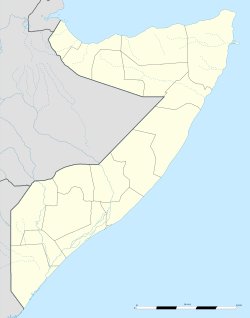El Adde Ceel Cadde | |
|---|---|
Town | |
| Coordinates: 3°2′9″N41°52′3″E / 3.03583°N 41.86750°E | |
| Country | |
| Region | Gedo |
| District | El Adde |
| Government | |
| • Control | |
| Area | |
• Total | 4 sq mi (10 km2) |
| Time zone | UTC+3 (EAT) |
El Adde (Somali : Ceel Cadde) is a town in the southwestern Gedo region of Somalia.[ citation needed ]
